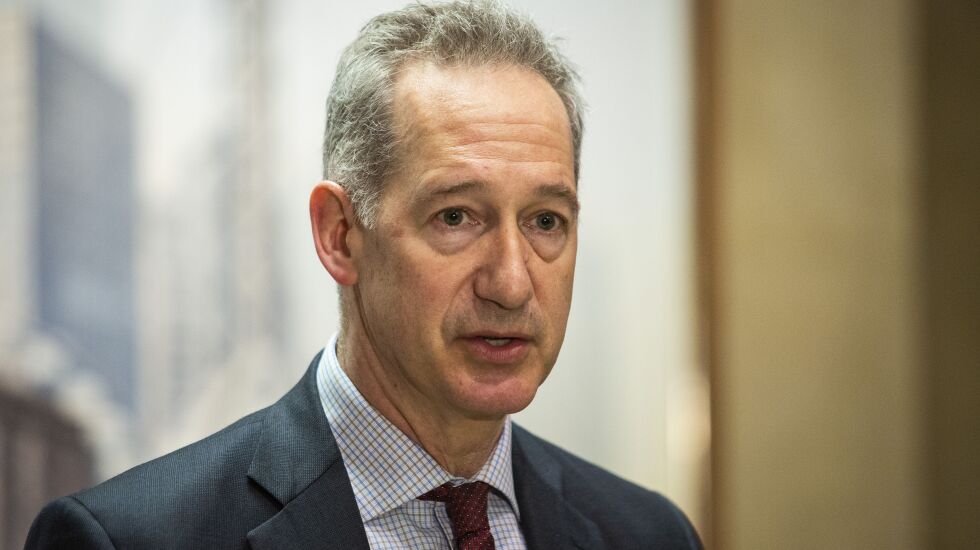
Former Inspector General Joe Ferguson is launching a new venture aimed at transforming what he calls Chicago’s “19th Century machine patronage culture” into a new structure of government capable of solving modern problems.
After a 12-year run as city watchdog, Ferguson resigned last fall to avoid being pushed out by Mayor Lori Lightfoot. She inherited Ferguson, whom she openly criticized, then made it clear he would not be reappointed.
During a stint at the University of Chicago’s Institute of Politics, Ferguson got the idea to launch a nonprofit he calls “Re-Imagine Chicago” as a way to do something that has not been done in this city in nearly 80 years.
That is, re-examine Chicago’s governing structure — from the mayor’s office, city departments and the City Council to agencies of local government under the mayor’s control. The goal is to show how it is “different from everywhere else” and how those differences “tie to our chronic ills.”
With “first-generation research” being done in collaboration with the University of Chicago’s Harris School of Government, Ferguson said his ultimate goal is to seek a change in state law.
That’s what’s needed to empower a citizens’ commission to recommend changes in the structure of a home-rule government like Chicago. Those changes would then be ratified by voters in a binding referendum, something that does not now exist in the city. All referenda are now advisory.
It’s a lofty goal, and it will ultimately require “upwards of $1 million” in fundraising for the first year alone and millions more if it takes longer.
But examining “how power operates, who holds it” and how imbalanced it is in this notoriously corrupt city is a passion project for Ferguson.

He’s a former federal prosecutor whose work as inspector general was instrumental in the corruption scandals still swirling around indicted Ald. Edward Burke (14th), indicted former Illinois House Speaker Michael Madigan and former Zoning Committee Chair-turned-FBI-mole Danny Solis (25th).
“In Chicago, it’s not balanced. An extraordinary amount of power is held by the mayor. There really are no checks and balances. The City Council is not an effective and meaningful check and partner with that essential tension that drives the actual vetting of policy proposals that result in better outcomes,” Ferguson said.
“In some respects, we have a 19th century, sort-of-machine patronage culture poured into a 20th century government that isn’t very well situated to meet 21st Century communities and problems. It’s Groundhog Day here, always. … You can almost write the same story in varying cycles in just about any area of our city every couple of years.”
Lightfoot campaigned on a promise to empower the inspector general to investigate other agencies of local government, only to abandon the idea — even after the lifeguard scandal at the Chicago Park District underscored the need for those expanded powers.
Over the years, there have also been periodic recommendations to cut the size of the 50-member City Council in half.
Rahm Emanuel floated that idea during his first mayoral campaign, only to drop the idea like the hot potato it was after taking office. He also retained Burke as finance committee chairman after threatening to dump him.
Ferguson said the new commission would almost certainly re-examine the size of the council. But it’s equally important to shine the light on what he called an “ineffective committee structure. The mayor picks committee chairs and half of the 19 committees meet seldom, if ever, or do only ceremonial work.
As an example of council dysfunction, Ferguson pointed to Lightfoot’s decision to appoint a special committee on a Chicago casino, but then bypass the panel entirely, and ram Bally’s $1.7 billion project through the council.
“I go back to the phrase, ‘learned helplessness.’ The mayor runs the City Council. There is no good outcome anywhere in which a single person basically decides everything. You need that critical tension. We need a City Council that actually has the expertise and works together collectively through a structure that actually puts the mayor to the test and doesn’t let things just get rammed through,” Ferguson said.
Andy Shaw, former president and CEO of the Better Government Association, wrote an op-ed in the Chicago Tribune recently, urging a legal challenge that could pave the way for Ferguson to join the crowded field of candidate lining up to deny Lightfoot a second term.
Ferguson agreed with Shaw that state and local laws that prohibit Chicago’s inspector general from seeking elective office for at least two years after leaving that job are blatantly unconstitutional and must be reversed, either through court action or legislative action.
Even so, he said he has no interest in joining the 2023 race for mayor.
“Elections are about a person. ... We have a paradigm problem,” he said.
“In this moment, what I’ve decided is my best contribution to trying to make the city better is to address the paradigm. We need a reset of our structure of our government. Every other city in the United States does it.”







